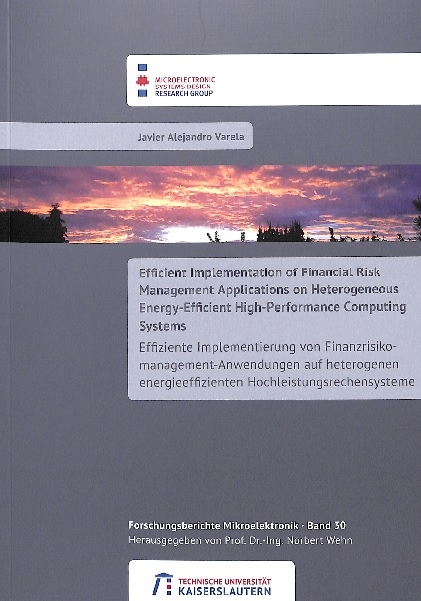
Efficient implementation of financial risk management applications on heterogeneous energy-efficient high-performance computing systems
Effiziente Implementierung von Finanzrisikomanagement-Anwendungen auf heterogenen energieeffizienten Hochleistungsrechensysteme
Seiten
2018
RPTU Rheinland-Pfälzische Technische Universität Kaiserslautern Landau (Verlag)
978-3-95974-100-2 (ISBN)
RPTU Rheinland-Pfälzische Technische Universität Kaiserslautern Landau (Verlag)
978-3-95974-100-2 (ISBN)
Abstract
Nowadays we finally see the strong convergence of high-performance computing (HPC)
and embedded systems, in order to increase system-level energy efficiency and runtime
performance. And at the same time, we observe a growing adoption of cloud computing, a
pay-per-use service providing access to a shared pool of hardware and software resources.
One industry that is currently profiting from both trends is finance.
In this regard, financial risk management is nowadays a key part of the daily operations
in the financial industry. Its importance became evident when failure to properly control and
manage risk exposure contributed to the latest financial collapses, including the meltdown
and bankruptcy of large financial institutions worldwide. As a result, stricter regulations
have been set into place, enforcing for example the regular monitoring of risk measures.
And from the technology standpoint, two trends are visible nowadays in the financial industry:
the growing transition into cloud computing services, and the widespread adoption
of electronic trading systems. Under these circumstances, there is a real need in this field
for computing systems with low latency, high throughput, and high energy efficiency.
This is an excellent case where heterogeneous energy-efficient HPC systems can be deployed.
They not only exploit the capabilities of central processing units (CPUs), but also
include one or several types of hardware accelerators, such as many integrated core (MIC)
architectures, graphics processor units (GPUs), and field programmable gate arrays (FPGAs).
To handle this heterogeneity, the Open Computing Language (OpenCL) framework
is widely used nowadays to generate portable parallel code. And although this heterogeneity
makes these systems more flexible, it also introduces a series of challenges to be
addressed in order to efficiently implement any given application.
In this context, the goal of my research has been to efficiently implement relevant financial
risk management applications on heterogeneous energy-efficient HPC systems. The
novel contributions presented in this thesis are bundled into four main topics:
1. a massive acceleration of the risk measurement of complex financial portfolios under
compute-intensive nested Monte Carlo (MC)-based simulations, making this approach
feasible for intraday operation. This also includes the real-time continuous
risk monitoring of dynamic portfolios, and a cloud-based implementation test case.
2. the efficient implementation of theMC-based Longstaff-Schwartz algorithm on FPGAbased
systems, including tailor-made algorithmic optimizations, to price multidimensional
American-style options. Options are derivative contracts widely employed for
risk hedging, and they are also extensively traded in the financial market.
3. the efficient decoupling of parallel OpenCL work-items on FPGAs, to maximize the
performance of parallelized algorithms that contain data-dependent branches, where
these work-items diverge. Test case: a nested rejection-based gamma-distributed
random number generator (RNG), typically used in CreditRisk+ simulations.
4. the evaluation, in an interdisciplinary research environment, of the typical trade-off
between programming productivity and implementation efficiency. Test case base
combination: Python (an interpreter language) for productivity, the PyOpenCL package
for efficiency, all contained in a Jupyter Notebook (a web-based application).
These novel contributions are the outcome of a successful interdisciplinary research
cooperation between financial mathematics and computer engineering, in the scope of the
Research Training Group RTG 1932 “Stochastic Models for Innovation in the Engineering
Sciences”, funded by the Deutsche Forschungsgemeinschaft (DFG). In this regard, we have
developed a remarkably strong interaction between both fields, where the optimizations and
characteristics of each side have influenced the other one, in a very profitable way.
Nowadays we finally see the strong convergence of high-performance computing (HPC)
and embedded systems, in order to increase system-level energy efficiency and runtime
performance. And at the same time, we observe a growing adoption of cloud computing, a
pay-per-use service providing access to a shared pool of hardware and software resources.
One industry that is currently profiting from both trends is finance.
In this regard, financial risk management is nowadays a key part of the daily operations
in the financial industry. Its importance became evident when failure to properly control and
manage risk exposure contributed to the latest financial collapses, including the meltdown
and bankruptcy of large financial institutions worldwide. As a result, stricter regulations
have been set into place, enforcing for example the regular monitoring of risk measures.
And from the technology standpoint, two trends are visible nowadays in the financial industry:
the growing transition into cloud computing services, and the widespread adoption
of electronic trading systems. Under these circumstances, there is a real need in this field
for computing systems with low latency, high throughput, and high energy efficiency.
This is an excellent case where heterogeneous energy-efficient HPC systems can be deployed.
They not only exploit the capabilities of central processing units (CPUs), but also
include one or several types of hardware accelerators, such as many integrated core (MIC)
architectures, graphics processor units (GPUs), and field programmable gate arrays (FPGAs).
To handle this heterogeneity, the Open Computing Language (OpenCL) framework
is widely used nowadays to generate portable parallel code. And although this heterogeneity
makes these systems more flexible, it also introduces a series of challenges to be
addressed in order to efficiently implement any given application.
In this context, the goal of my research has been to efficiently implement relevant financial
risk management applications on heterogeneous energy-efficient HPC systems. The
novel contributions presented in this thesis are bundled into four main topics:
1. a massive acceleration of the risk measurement of complex financial portfolios under
compute-intensive nested Monte Carlo (MC)-based simulations, making this approach
feasible for intraday operation. This also includes the real-time continuous
risk monitoring of dynamic portfolios, and a cloud-based implementation test case.
2. the efficient implementation of theMC-based Longstaff-Schwartz algorithm on FPGAbased
systems, including tailor-made algorithmic optimizations, to price multidimensional
American-style options. Options are derivative contracts widely employed for
risk hedging, and they are also extensively traded in the financial market.
3. the efficient decoupling of parallel OpenCL work-items on FPGAs, to maximize the
performance of parallelized algorithms that contain data-dependent branches, where
these work-items diverge. Test case: a nested rejection-based gamma-distributed
random number generator (RNG), typically used in CreditRisk+ simulations.
4. the evaluation, in an interdisciplinary research environment, of the typical trade-off
between programming productivity and implementation efficiency. Test case base
combination: Python (an interpreter language) for productivity, the PyOpenCL package
for efficiency, all contained in a Jupyter Notebook (a web-based application).
These novel contributions are the outcome of a successful interdisciplinary research
cooperation between financial mathematics and computer engineering, in the scope of the
Research Training Group RTG 1932 “Stochastic Models for Innovation in the Engineering
Sciences”, funded by the Deutsche Forschungsgemeinschaft (DFG). In this regard, we have
developed a remarkably strong interaction between both fields, where the optimizations and
characteristics of each side have influenced the other one, in a very profitable way.
| Erscheinungsdatum | 07.12.2018 |
|---|---|
| Reihe/Serie | Forschungsberichte Mikroelektronik ; 30 |
| Sprache | englisch |
| Maße | 148 x 210 mm |
| Themenwelt | Mathematik / Informatik ► Informatik |
| Technik ► Elektrotechnik / Energietechnik | |
| Schlagworte | energy efficiency • financial risk management • Heterogeneous high-performance computing systems • interdisciplinary research |
| ISBN-10 | 3-95974-100-6 / 3959741006 |
| ISBN-13 | 978-3-95974-100-2 / 9783959741002 |
| Zustand | Neuware |
| Haben Sie eine Frage zum Produkt? |
Mehr entdecken
aus dem Bereich
aus dem Bereich
Buch | Softcover (2024)
BILDNER Verlag
39,90 €
Buch | Softcover (2023)
BILDNER Verlag
49,90 €


